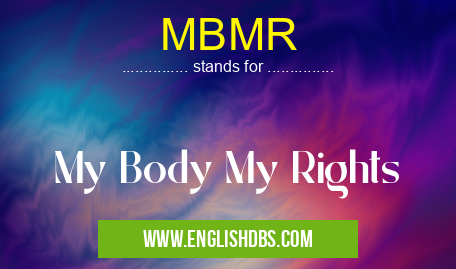What does MBMR mean in UNCLASSIFIED
Abbreviations are commonly used as a tool to shorten and simplify complex sentences by replacing long words or phrases with letters. One such abbreviation is MBMR, which stands for “My Body My Rights”. This acronym has been gaining popularity with the growth of different movements related to bodily autonomy and rights in recent years.

MBMR meaning in Unclassified in Miscellaneous
MBMR mostly used in an acronym Unclassified in Category Miscellaneous that means My Body My Rights
Shorthand: MBMR,
Full Form: My Body My Rights
For more information of "My Body My Rights", see the section below.
Meaning
MBMR is an acronym that stands for "My Body My Rights" and is mostly associated with the movements advocating for bodily autonomy. It signifies principles focused on respecting people's individual liberties pertaining to their bodies, including but not limited to reproductive health, gender identity, sexual orientation, or racial identity. By asserting one’s fundamental right over their physical selves, this movement seeks to protect people from any wrongdoings or judgments caused due to their natural inclinations or beliefs.
Significance
The MBMR phrase implies that everyone should be able to decide autonomously what is best for themselves when it comes to their body without being judged upon or forced against their will. It further suggests that all individuals should have control over their own fate regardless of gender, age, race or faith that they identify with. Over time this phrase has become a symbol of different struggles and campaigns revolving around bodily autonomy such as women’s rights and access to safe abortion services since it allows individuals to take charge of decisions involving intimate matters concerning them without fear of humiliation or oppression based on societal norms.
Essential Questions and Answers on My Body My Rights in "MISCELLANEOUS»UNFILED"
What is My Body My Rights?
My Body My Rights is an international campaign by Amnesty International that calls for states and other stakeholders to ensure that laws, regulations, and policies respect people’s bodily autonomy, and ensure access to health services and sexual and reproductive rights.
What kind of rights does the campaign promote?
The campaign promotes the right to bodily autonomy, the right to make healthcare decisions about one’s own body free from coercion, discrimination or violence; the right to contraception; access to safe abortion; comprehensive sexuality education; reproductive freedom; and protection from gender-based violence.
How can governments ensure these rights are respected?
Governments should take steps to fully protect bodily autonomy in law, policy and practice. This includes reforming legislation so that it is in line with international human rights standards including the elimination of restrictions on access to abortions services; ensuring full access to comprehensive sexuality education for young people; introducing affirmative consent in laws on sexual offences; actively combatting stigma around contraception use as well as any other form of discrimination based on gender identity or expression.
Is this just an issue for women?
No. The promotion of bodily autonomy concerns everyone – regardless of age, gender identity or expression, race/ethnicity, sexual orientation and/or migration status. Everyone must have equal access to safe abortion services without stigma or judgement.
Who is responsible for protecting these rights?
Governments have a legal obligation under international law to protect these rights by respecting, protecting, promoting and fulfilling all human rights obligations without discrimination of any kind. States have a duty to take effective legislative measures towards achieving the realization of reproductive health care services such as contraception and abortion care. All stakeholders including civil society actors also have shared responsibility for safeguarding these fundamental rights.
What role do civil society actors play in securing these rights?
Civil society actors play a vital role in amplifying voices from marginalised communities who often experience systematic barriers in accessing their fundamental bodily autonomy-related rights due to socio-economic inequalities among others. Civil society organisations also serve as a watchdog against state violations when it comes upholding basic human freedoms such as those related to reproductive health care services.
Final Words:
In today's increasingly globalized society where people from diverse backgrounds interact daily, conversations about bodily autonomy and rights are crucial in order achieve an environment free from any sort of discrimination or marginalization. The MBMR phrase serves as a reminder of the importance of standing up for oneself against policies leading oppression and hence can be seen as a call to action inspiring people around the globe towards achieving an equitable world where everyone has full freedom regarding decisions about their body.
